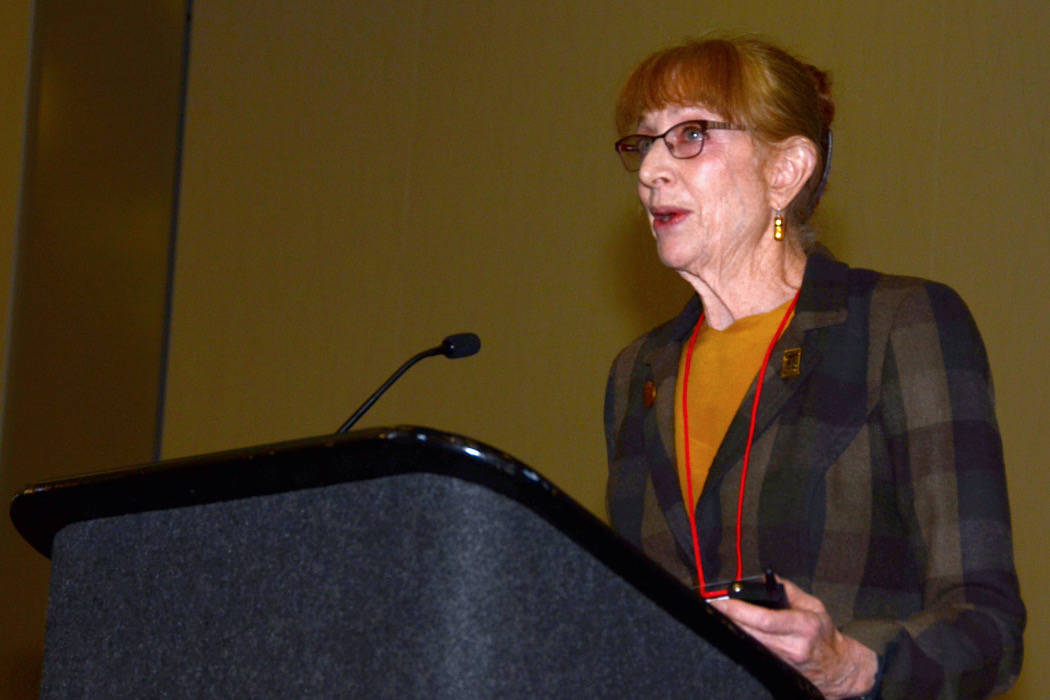When former Juneau resident Dr. Wini Kessler began her 45-year career in wildlife ecology, she was often the only female in the room.
“There really weren’t other women. Every job I had in my career I was the first woman in that job,” Kessler said.
Now, she’s received the field’s top honor. After rising to leadership positions with the U.S. Forest Service Alaska Region and in academia, Kessler has become the second woman ever to receive the highest honor in wildlife sciences: the Aldo Leopold Award.
Kessler was honored for her work in conservation, ecosystem-based management and education. A Juneau resident in the 1980s and again in the 2000s, she delivered the keynote address at The Wildlife Society’s annual conference in Cleveland, Ohio, Oct. 7-11.
Wildlife toxicologist Lucille Stickel was the first woman to receive the honor. Stickel is known for her research into the effects of pesticide DDT, which formed the basis of Rachel Carson’s famous book “Silent Spring.”
In Kessler’s remarks to the conference, she cited a few epiphanies in her trailblazing career. She recounted those moments to the Empire in a Thursday interview from her home in British Columbia.
When Kessler was still an undergraduate student at University of California-Berkeley, for instance, she decided to attend a seminar with a visiting scientist.
Afterward, the male attendees met up at a bar. She decided to join them.
“When I got in, the speaker, he stopped and gave me this most annoyed look. He said ‘Young woman, do you belong here?’ I just froze, like a deer in the headlights. I was just ready to turn tail and run, which would have been the end of my career. But one of the professors said, ‘Oh yeah, she’s one of ours, come on over here, here’s a chair.’ It was a pivotal moment,” Kessler said.
Kessler spent about half of her career at universities and half with the U.S. Forest Service. She earned her bachelor’s in zoology and a master’s after that at Berkeley, then a Ph.D. at Texas A&M.
Many employers held policies of not hiring women for field work in the early 1970s, she said. That didn’t stop her.
“My attitude became, I’ll just keep improving and strengthening my expertise and what I can bring. I can’t get a job with a bachelor’s, OK, I’ll go get a master’s. I couldn’t get a job with a master’s, fine, I’ll go get a Ph.D.,” Kessler said.
Kessler is known for being on the vanguard of a philosophical shift in forest management. Shortly after her first job at the University of Idaho in the early 1980s, she took a newly-created position of Regional Ecologist with the U.S. Forest Service’s Alaska Region.
At the time, the Forest Service handed out 50-year contracts to timber companies, allowing them to log old growth forest under a management philosophy that prioritized forest products, Kessler said.
But a growing body of science favored the idea that public lands are worth more than what they can bring in immediate economic value, Kessler said, an idea now known as ecosystem-based management.
Alaska old growth provided much-needed habitat for Sitka black tail deer, goshawks, brown bear and salmon — animals whose habitat logging practices put at risk.
“There was quite a lot of knowledge being amassed; Forest Service researchers, Fish and Game researchers, university researchers finding out that there’s so much value to the importance of these forests, leaving this ecosystem intact,” Kessler said.
Kessler was soon tapped for a U.S. Forest Service special assignment in Washington, D.C., helping the agency transition to ecosystem-based management. The shift was from managing the habitat after humans had taken what they want, to managing for needs of all wildlife.
“If you have a situation where the foresters are just interested in taking the timber, and the range people are just interested in grazing the cows, what you get is just management by default, because the habitat that results is the leftovers from those activities,” Kessler said.
In 2000, she returned to Juneau to take a position as a USFS regional director, working directly under the top USFS official in the state. She found herself restoring ecosystems harmed from logging, she said.
Now retired, Kessler said she’s as busy as she’s ever been serving on several conservation boards. Forest management has changed a lot since she started, Kessler said. So too have the faces around the room. She credits to the strong networks of female scientists for changing the face of wildlife ecology. She expects a wave of women to hold the Aldo Leopold Award in subsequent years.
In Kessler’s time, the “renegades” often stuck up for her, she said. She counts herself as fortunate that in science, it’s often the renegades who break intellectual ground.
“For all the other ones in the room who feel like they don’t belong, there’s a ton of research that shows the importance of diversity. … It’s an extremely positive thing,” Kessler said.
• Contact Kevin Gullufsen at 523-2228 and kgullufsen@juneauempire.com. Follow him on Twitter at @KevinGullufsen.

